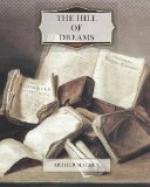A cold wind blew up from the river at sunset, and the scars on his body began to burn and tingle. The pain recalled his ritual to him, and he began to recite it as he walked along. He had cut a branch of thorn from the hedge and placed it next to his skin, pressing the spikes into the flesh with his hand till the warm blood ran down. He felt it was an exquisite and sweet observance for her sake; and then he thought of the secret golden palace he was building for her, the rare and wonderful city rising in his imagination. As the solemn night began to close about the earth, and the last glimmer of the sun faded from the hills, he gave himself anew to the woman, his body and his mind, all that he was, and all that he had.
IV
In the course of the week Lucian again visited Caermaen. He wished to view the amphitheatre more precisely, to note the exact position of the ancient walls, to gaze up the valley from certain points within the town, to imprint minutely and clearly on his mind the surge of the hills about the city, and the dark tapestry of the hanging woods. And he lingered in the museum where the relics of the Roman occupation had been stored; he was interested in the fragments of tessellated floors, in the glowing gold of drinking cups, the curious beads of fused and colored glass, the carved amber-work, the scent-flagons that still retained the memory of unctuous odors, the necklaces, brooches, hair-pins of gold and silver, and other intimate objects which had once belonged to Roman ladies. One of the glass flagons, buried in damp earth for many hundred years, had gathered in its dark grave all the splendors of the light, and now shone like an opal with a moonlight glamour and gleams of gold and pale sunset green, and imperial purple. Then there were the wine jars of red earthenware, the memorial stones from graves, and the heads of broken gods, with fragments of occult things used in the secret rites of Mithras. Lucian read on the labels where all these objects were found: in the churchyard, beneath the turf of the meadow, and in the old cemetery near the forest; and whenever it was possible he would make his way to the spot of discovery, and imagine the long darkness that had hidden gold and stone and amber. All these investigations were necessary for the scheme he had in view, so he became for some time quite a familiar figure in the dusty deserted streets and in the meadows by the river. His continual visits to Caermaen were a tortuous puzzle to the inhabitants, who flew to their windows at the sound of a step on the uneven pavements. They were at a loss in their conjectures; his motive for coming down three times a week must of course be bad, but it seemed undiscoverable. And Lucian on his side was at first a good deal put out by occasional encounters with members of the Gervase or Dixon or Colley tribes; he had often to stop and exchange a few conventional expressions, and such meetings, casual




